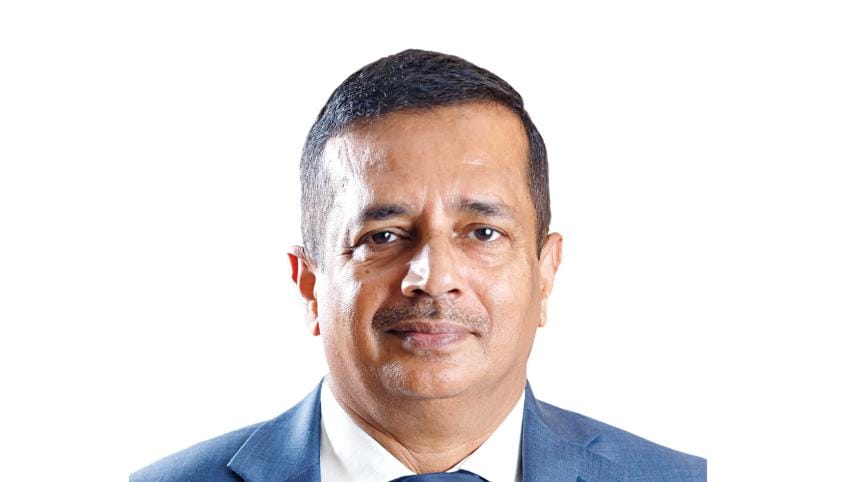Financing that puts the earth first

Ahsan Zaman Chowdhury
Managing Director & CEO, Trust Bank
The Daily Star (TDS): How would you assess the current state of sustainable banking in Bangladesh?
Ahsan Zaman Chowdhury (AZC): Sustainability has become one of the mainstream aspects of the banking sector. It is connected through sustainable finance, which generally refers to the process of taking due account of environmental, social and governance (ESG) considerations when making investment decisions in the financial sector.
Banks have been adopting sustainable and green banking practices primarily to comply with regulatory requirements. However, sustainable banking can make positive changes by leveraging human talent, resources, and vision towards environmentally and socially desirable goals. It engages all stakeholders and aims to create an inclusive and greener economic and environmental system. It also introduces ESG standards, as well as risk management, into the lending practices of banks. In banking, it is directly related to financing projects.
TDS: What sustainable financing/refinancing schemes does your bank offer, particularly for SMEs, women entrepreneurs, or other environmentally responsible enterprises?
AZC: Trust Bank's greatest priority is sustainable and green financing for the protection and conservation of the environment. The bank is focusing on promoting products, projects, and initiatives related to this sector, which will ensure an inclusive and equitable approach towards economic and environmental development. In 2024, TBL disbursed BDT 130,549.20 million as sustainable finance, which was 49% of the bank's total disbursement.
Green finance is a term that refers to those projects that support sustainable development, including financing in biodiversity protection, water sanitation, industrial pollution control, energy efficiency, climate change adaptation, and renewable energy. It also refers to financing in environmentally friendly projects that will support the creation of a healthy environment, not only for the present but also for future generations. Our total green finance outstanding in 2024 is BDT 214,901.70 million.
Trust Bank has been offering the following products related to SMEs, women entrepreneurs, and the agricultural sector:
- Trust Nondini: A women entrepreneurship loan for setting up business units/industries or for the expansion of existing businesses. It covers fixed assets such as plant, machinery, air conditioners, furniture, and fixtures.
- Trust Muldhan: Designed to meet working capital requirements and for the expansion of existing businesses.
- Trust Ekota: A loan product for groups of small entrepreneurs (both male and female). Trust Ekota is specially designed for groups such as nakshikantha makers, tribal weavers, potters, bamboo and cane producers, agricultural equipment makers, and other income-generating activities, who are often deprived of bank loan facilities, so that they can operate their businesses smoothly.
TDS: What initiatives has your bank undertaken to promote sustainable banking, and what measures have you implemented to reduce your own carbon footprint?
AZC: Green finance is part of ethical financing and, subsequently, of sustainable finance. It promotes environmental and resource conservation by reducing the consumption of electricity, water, and paper, and by moving away from paper-based transactions across operations.
TBL financed 2,934 biogas plants and is recognised as a pioneer in the banking sector in this area. A village has been named Trust Bank Solar Village in Howlipara, Jhenaidah. At the end of 2024, our total outstanding in sustainable finance was BDT 148,454.80 million.
As Bangladesh Bank has been encouraging sustainable banking, Trust Bank has implemented a green financing policy for its product offerings, along with guidelines for its office and business operations. We have adopted environmentally friendly initiatives in every area, guided by the spirit of green banking in all of our financing decisions.
TDS: What challenges has your bank encountered in adopting and promoting sustainable banking practices?
AZC: Bangladesh Bank has introduced guidelines for green and sustainable banking. However, the demand for green finance products remains relatively low in Bangladesh due to limited consumer awareness. This can obstruct the bank's ability to scale up its sustainable banking portfolio and makes it difficult to attract sufficient investment into sustainable sectors.
Bangladesh is one of the most climate-vulnerable countries in the world, facing frequent flooding, cyclones, and rising sea levels. These environmental risks could impact the assets of borrowers and lead to defaults, particularly in sectors such as agriculture, which are highly dependent on environmental stability. The bank may also face credit risk if borrowers involved in sustainable projects fail to generate expected returns. For instance, renewable energy projects may take longer to become profitable, creating uncertainty about the bank's financial returns on such investments. Environmental degradation and climate change are also major challenges for a bank to engage in sustainable finance.
TDS: What are your bank's future plans to advance sustainable banking, and what support do you seek from the government?
AZC: Bangladesh Bank evaluates banks and financial institutions every year based on five key indicators. These are the Sustainable Finance Index, CSR activities, green project financing, core banking sustainability, and banking services coverage. This rating encourages financial institutions to integrate environmental, social, and governance (ESG) considerations into their operations.
In 2022 and 2023, Trust Bank PLC was recognised as one of the seven banks in the Sustainability Rating 2022. The bank aims to maintain this position in the coming years as well.



 For all latest news, follow The Daily Star's Google News channel.
For all latest news, follow The Daily Star's Google News channel.
Comments